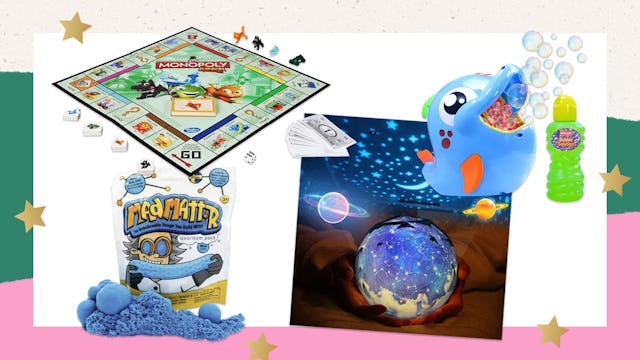17 Best Toys And Gifts For Kids With Autism, According To Experts

If you’re looking to buy a present for a child with autism, there are definitely some staple toys to consider. For many individuals with autism, specific toys and games help develop certain needed skills, and help comfort and soothe them in times of need.
But at the end of the day, the individual needs of children with autism, are, well, individual, according to Becca Browar, a client coordinator and RBT (registered behavioral technician) at Behavioral Health Kansas City, who has worked with kids with autism for the past half decade.
“Anybody who knows one person with autism — you know one person with autism, and you will never ever meet another person with autism that is exactly the same.” And so, Browar recommends asking parents what they kids are interested in, as far as movies or books, as well as what kind of sensory toys they enjoy. More importantly, she suggests asking the parents what the kids don’t enjoy and what they’re scared of.
“Then in comes to the question of, are you getting them a toy for fun or are you buying them a toy to learn?” Browar adds.
With all of Browar’s recommendations in mind, Scary Mommy has curated the best gifts and toys for kids with autism that are great for learning and for fun.
Shape Sorter and Ring Stacker
“There are toys that I would say are basic staples for a child with autism — anything dealing with spatial recognition like shape sorters, ring stackers,” says Browar, who uses the toys for therapy, with kids ages 18 months to sometimes 5 to 6 year olds.
“We’re using the shape sorters not only to identify different shapes,” Browar explains, “but also to learn how to match those shapes, identify colors how to use your spatial recognition to turn them in your hand, which also deals with fine motor movements — those are those early development pieces that I think are really crucial.”
Toys With Zippers or Snaps
Depending on the kid with autism you are buying this present for, toys that have different fasteners, like zippers, buttons or snaps could be really beneficial. “Those are functional skills that we usually have to target with kids on the autism spectrum,” Browar explains.
Play Doh or Silly Putty
“I don’t think you can go wrong with art supplies,” Browar tells Scary Mommy. “Any type of Play Doh or clay that helps with fine and gross motor skills and allows them creative opportunities. Anything with good tactile sensory input that can be Play Doh, it can be Putty, it can be toys that different textures on them.”
Special Lamp
“I’ve had a lot of clients that love light toys, things that project light on the wall,” Browar says. “There are those [with] fiber optic lights that also add a tactile element.”
Weighted Toy or Blanket
“Weighted blankets can be incredibly soothing for children with autism,” Browar says, “I mean they can be incredibly soothing for anyone. I myself would love to have one. Especially when a child is escalated in anger, overstimulated or inconsolable, a weighted blanket or toy could help them relax.”
Bubble Machine
“You can not go wrong with a bubble machine,” Browar says. “It touches on a visual sensory stimulation — the bubbles are floating, and moving around, a lot of light toys change color throughout and have some movement to them. There’s also a low frequency but constant noise to them. Just those little motors moving — I’ve had kids who didn’t care if bubbles were coming out of the machine, just as long as there was the noise. There’s also a tactile sensory stimulation — touching and grabbing the bubbles.”
Board Games
Browar often uses Board games in her work: “With my older, board games like Hi Ho Cheery-O to Monopoly address a lot of skills, math games are also great if they’re interested.”
Rebecca Yochelson, a school psychologist who works with children with autism in New York City also recommends the board game Hoot Owl Hoot, “it’s a board game that doesn’t seem to work on any skills — but it actually teaches kids to work together as a team to win the game.”
There’s another reason the kids Browar works with enjoy board games, they provide a chance for specialized attention: “Some kids with autism, they don’t care about toys at all,” Browar says, “They’d much rather have your attention, and that’s better than any toy.”
Read More:
SHOP THE STORY
This article was originally published on